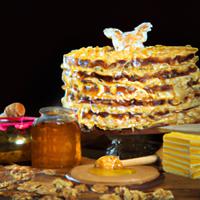
1 serving (100 grams) contains 350 calories, 6.0 grams of protein, 18.0 grams of fat, and 40.0 grams of carbohydrates.

Log this food in SnapCalorie

Nutrition Information
Calories |
833.3 | ||
|---|---|---|---|
% Daily Value* |
|||
| Total Fat | 42.9 g | 55% | |
| Saturated Fat | 23.8 g | 119% | |
| Polyunsaturated Fat | 0 g | ||
| Cholesterol | 119.0 mg | 39% | |
| Sodium | 357.1 mg | 15% | |
| Total Carbohydrates | 95.2 g | 34% | |
| Dietary Fiber | 2.4 g | 8% | |
| Sugars | 59.5 g | ||
| protein | 14.3 g | 28% | |
| Vitamin D | 0 mcg | 0% | |
| Calcium | 119.0 mg | 9% | |
| Iron | 2.4 mg | 13% | |
| Potassium | 238.1 mg | 5% | |
* Percent Daily Values are based on a 2,000 calorie diet. Your daily values may be higher or lower depending on your calorie needs.
Food Attributes
Source of Calories
About Bienenstich cake
Bienenstich Cake, or "Bee Sting Cake," is a classic German dessert known for its sweet, nutty flavors and soft texture. This indulgent treat features a yeasted dough or sponge base, layered with a creamy custard filling, and topped with a caramelized almond crust. Its origins trace back to Germany, where it remains a beloved staple for celebrations and afternoon coffee breaks. While the custard provides some calcium and the almonds add healthy fats and vitamin E, Bienenstich is high in sugar, refined carbohydrates, and saturated fats, making it a dessert best enjoyed in moderation. Its rich flavors and unique texture have earned it a global fanbase, offering a decadent taste of German baking tradition.



